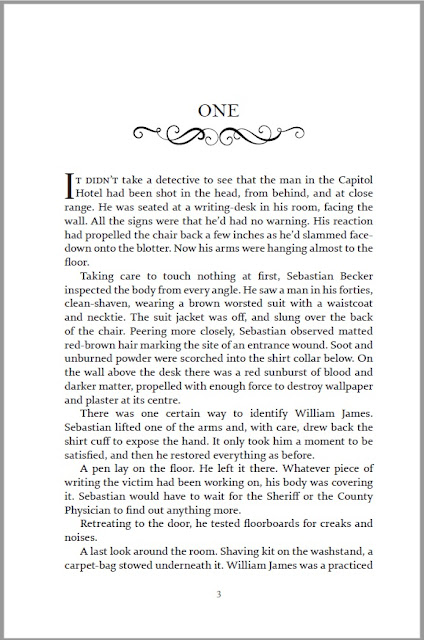As the Special Investigator to the
Lord Chancellor’s Visitor in Lunacy, Sebastian Becker delivers justice
to those dangerous madmen whose fortunes might otherwise place them
above the law.
But in William James he faces a different challenge; to prove a man sane, so that he may hang. Did the reluctant showman really burn down a crowded pavilion with the audience inside? And if not, why is this British sideshow cowboy so determined to shoulder the blame?
But in William James he faces a different challenge; to prove a man sane, so that he may hang. Did the reluctant showman really burn down a crowded pavilion with the audience inside? And if not, why is this British sideshow cowboy so determined to shoulder the blame?
The Authentic William James is the third novel to feature ex-police detective and former Pinkerton Man Sebastian Becker, joining The Kingdom of Bones and The Bedlam Detective.
Praising "this superbly crafted thriller", Kirkus Reviews named The Bedlam Detective one of their 100 Best of the Year and called it "that rare beast, a literary page turner".
MysteryTribune.Com described it as "a rare literary masterpiece for lovers of historical crime fiction."
Of The Authentic William James, author and screenwriter Stephen Volk (Ghostwatch, Afterlife, The Parts We Play) says:
"It's a blinding novel... the acerbic wit, the brilliant dialogue - the sheer spot-on elegance of the writing: the plot turns, the pin sharp beats. Always authoritative and convincing, never showy. Magnificently realised characters in a living breathing world... Absolutely stunning."
In their starred review of The Authentic William James, Publishers Weekly wrote:
"Gallagher gives Sebastian Becker another puzzle worthy of his quirky sleuth’s acumen in this outstanding third pre-WW1 mystery."
"Only bad thing about his books is that they eventually end. Brilliant.”
—Jonny Lee Miller



















































